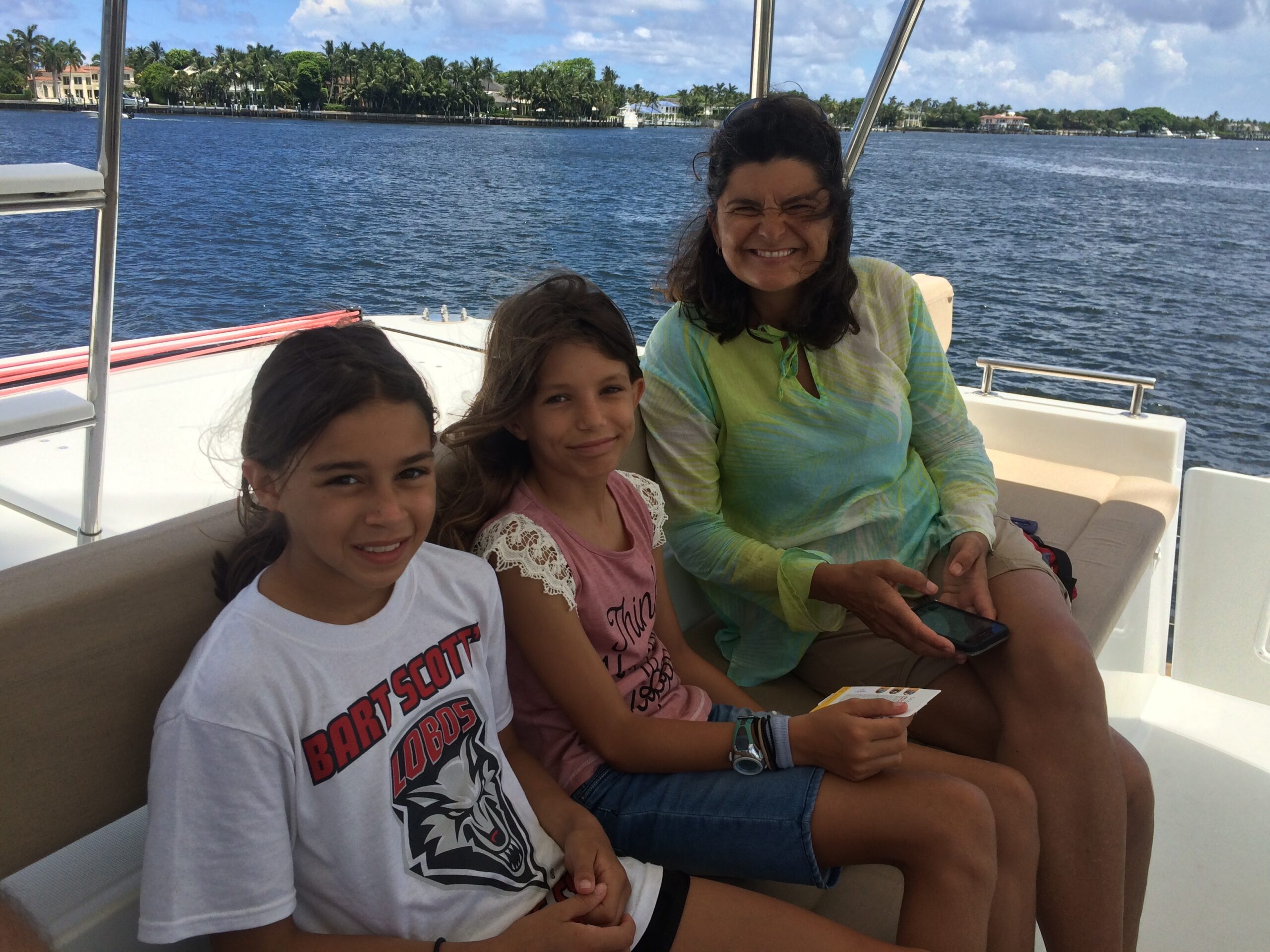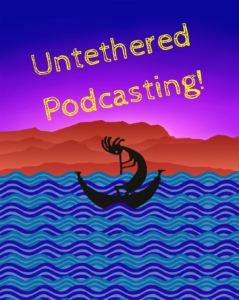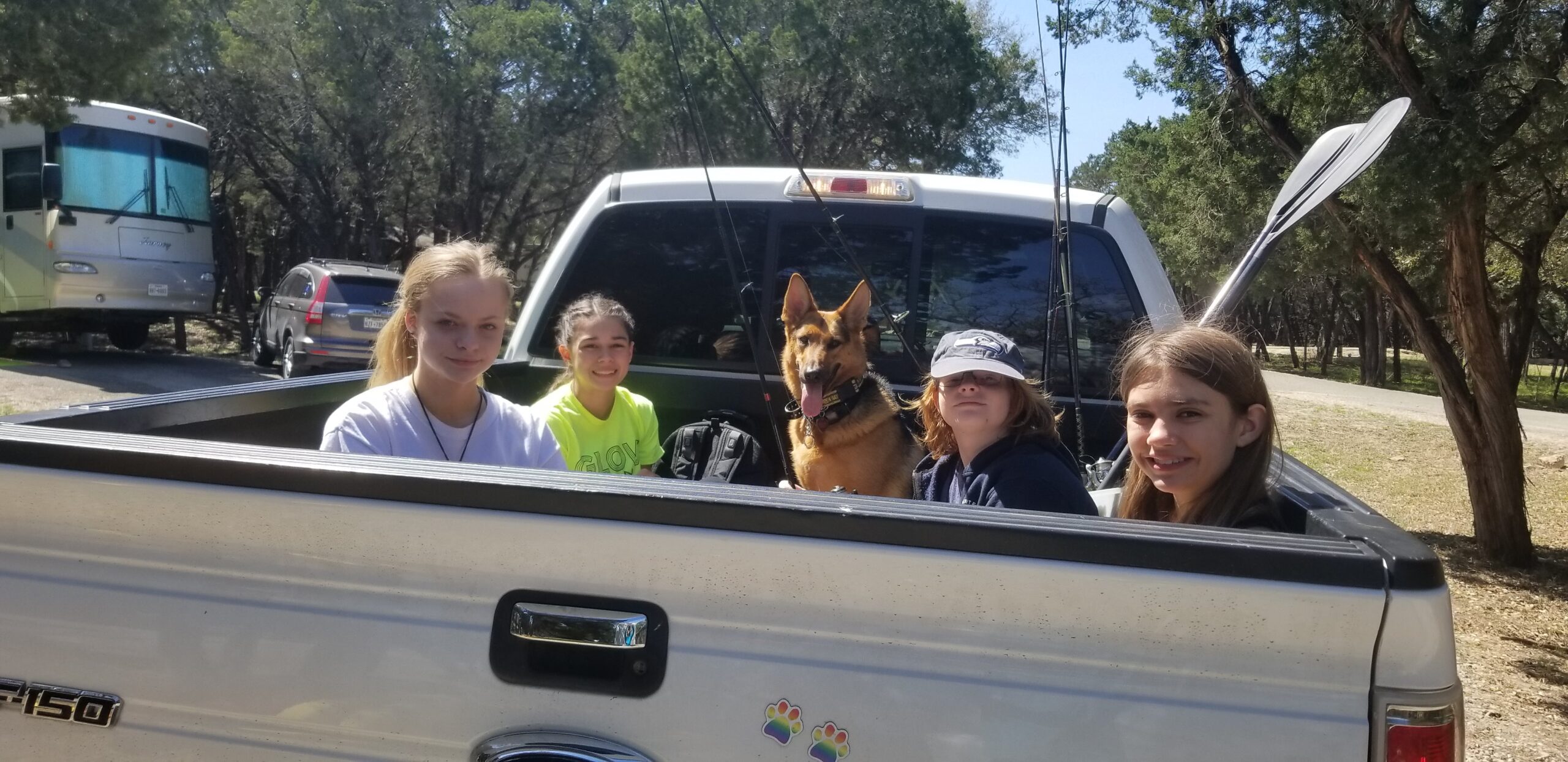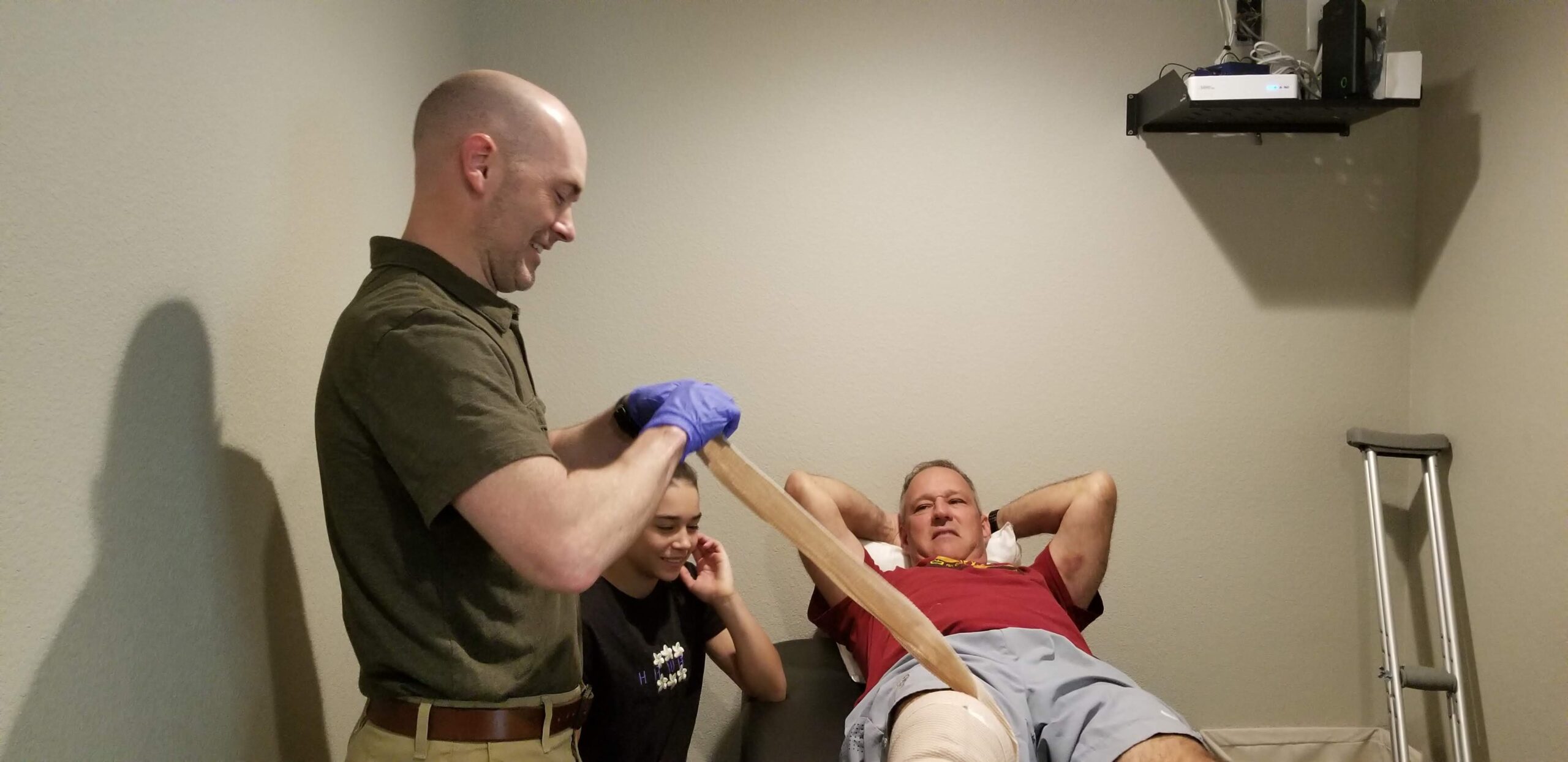
NMC025 Sea Sickness and Gymnastics
Rosa Linda

Podcast: Play in new window | Download | Embed
Subscribe: Apple Podcasts | Google Podcasts | Spotify | RSS
Recorded: July 17, 2016
Location: West Palm Beach, Florida
Subject: Friends visiting, brainstorming solutions for our gymnast and dreaming of the Bahamas.
Hello friends!
This week’s episode takes us back to July 2016, just a few weeks into our liveaboard adventure aboard the s/v Dawn Treader. First, we had a wonderful visit from some Bahamian friends who we first met on our favorite island of Hope Town in the Abacos when we lived on our first boat, Hakuna Matata. Sadly, there was some sea sickness on that visit but I think everyone enjoyed themselves anyway.
I also share some brainstorming ideas about gymnastics as that was a hot topic for our family back then. Our daughter, Ahava, was a competitive gymnast and finding creative ways to help her continue her sport was always on the agenda. Looking back, I am amazed at how we managed to support her and still pursue so many great adventures along the way.
Have a great week everyone!
Lots of love,
Rosa Linda
P.S. If you enjoyed this podcast and want to learn more, here’s how to:
Join the New Mexi-Castaways Crew
Follow us on Instagram, Twitter or Facebook
Watch NewMexicastTV
Featured in this Episode:
Get the Full Episode Transcript:
download the transcriptEpisode Transcript:
Rosa Linda Román (00:28): Hello and welcome to New Mexicast. I'm Rosa Linda Román and this is our audio podcast for what I like to call New Mexi-Castaways. Basically, New Mexicast is a TV show and you can find all of the archives and stories of feature stories about enchanting people we have met along the way on New Mexicast TV on YouTube, or you can get my live streaming TV show stuff on facebook.com/newmexicast and also New Mexicast on Periscope. However, this is the audio edition, which is my personal venting, rambling, brainstorming spot. And I just like to talk and share some of the process as my family went from our home in New Mexico to living on a 45 foot sailing catamaran. The boat is called the Dawn Treader. If any of you have read the Chronicles of Narnia, you know that is the boat that Prince Caspian and Reepicheep and others on board. Lucy sailed to the end of the world of Narnia. And so, and did so successfully I might add. We chose the name cause we certainly didn't want any name that was associated with a negative connotation. I'm very superstitious when it comes to a lot of things, which is kind of funny if you know me, but in particular, when it comes to the sea, I do not take any chances. And therefore we choose not to anger the, the sea gods, if you will. And I use that tongue in cheek, but basically we decided we needed a name that had a positive feeling and worked well with our family because we have three kids who live on board with us now, of course, and we have a little 12 week old German shepherd who is adorable, awesome, and giving us a total run for our money. Rosa Linda Román (02:36): I am leaving the train station in West Palm beach. T's the Amtrak station where I just said goodbye to my girlfriend, Rachel and her two lovely daughters Summer and Jasmine. They came over from Hope Town in the Abacos of The Bahamas and it's one of our favorite islands anywhere. We went there we met Rachel and her family and many other amazing people when we lived on a sailing catamaran back in 2009, which is now 2009, 2010, which is now five, six years ago. And so anyway she was coming with her family, her girls to go to universal studios up in Orlando but they had to stop in West Palm beach because her daughter Summer was on a mission trip and this is where they were flying in and out of. So they rendezvous here. We got to spend two days together. They joined us yesterday for a sail aboard the Dawn Treader. It was Jasmine's birthday. And I am sorry to report that Jasmine got seasick, not like sick, sick, but she was just a bit green and uncomfortable, which you hate to have happen when it's your home and it's her birthday. You want them to have a delightful, amazing time. But that is part of the challenge of living on a boat, right? Cause Rachel mentioned to me that if she had known it was going to be so rough, she, she probably wouldn't have done it. Well, to us it was very calm. When you live on a boat you know, your tolerance level is very different than a lot of peoples. And so, I realized I have to be really careful with our guests and be very proactive about the use of like dramamine andor a scopolamine patch because the thing I find is I'm, I don't get seasick at all. Rosa Linda Román (04:32): I mean, I can go down below, I I'm in the cabin, you know, cutting up fruit and just generally straightening up and doing things while we're underway. And everyone else has to sit up on deck, including my husband, by the way, Captain Nathan always gets slightly seasick. But he knows to wear a scopolamine patch. And Ms. Linda also took dramamine, our liveaboard nanny. Yeah. So it lesson learned, you know, we gotta be, when we have people visiting we gotta remember not everyone has that same disposition that I do as far as not getting seasick. So I'll try better next time to warn them to take something before it's too late. She did have those wristbands. I don't know if you've ever seen them, but it, it just looks like like a sweat armband, like when you work out and it's got a little dot that you place over the vein and your like the middle of your wrist, and it's supposed to help you with seasickness or morning sickness and just general if you get dizzy or have something like that, they help. But it just wasn't enough for Jasmine. Rosa Linda Román (05:46): What ended up helping her actually was that she, at some point, Nathan said, "Hey, why don't you take the helm and drive?" And so she did that and that helped. She actually wasn't feeling bad when she was at the wheel. And so I think that may be a really important lesson that when somebody is feeling seasick, what happens is you kind of like roll into a ball and just lie there, feeling more and more seasick and more and more lousy. So I think that that's the lesson to learn from this is (a) be proactive when it comes to having visitors on board. Let them know that it's better to err on the side of caution and take something, you know, some seasickness pill or, or a scopolamine patch in advance. Cause by the way, you can't take it once you're seasick, it doesn't do anything. You have to take it about. I think it's either a half hour, an hour before you sail. You should take something. But the other thing to learn is that once your, your mind is engaged with something else, generally you can let go of that seasickness. Right? Cause it's basically your mind telling you that something's wrong and you're off balance and things aren't right and that makes you feel sick. So when Jasmine was at the helm, she felt much better. She was able to, first of all, she's looking at the horizon, which is the first thing you should do if you're feeling seasick. Definitely look out into the distance. Don't look close because if you're looking close to where you are like at the deck or the worst thing, you know, don't read or look at a computer screen or a phone.You should look in the distance and if you can do something that engages your body and takes you out of your moment of misery, that you're in like driving, you know, being at the helm or even maybe curling ropes. Rosa Linda Román (07:48): That's a thing I think from now on, I'm going to just assign that right away for, especially the kids that come on board. Give them a task to do, and it helps your brain not not focus on the fact that you're feeling queasy. Right? Cause that just makes it worse. So those are some tips that I think really will help. I wanted to talk about our visitors a bit and I'm sure Rachel won't mind too much. It was so delightful to have them here cause it reminded me of what we have ahead of us. When we sailed to the islands. So they're taking the train up to Orlando because Rachel said, "Well, you know, I'm here for such a short time I don't feel like I would be able to get used to driving again." Like on the highway at 70 some miles an hour in such a short period of time because when they're on their Island of Hope Town they have very few cars. And the way everybody gets around is either a golf cart or a bike or, you know, maybe skateboards, skates. But that, it just made me smile so much because that is what, one of the things we absolutely adore about the Islands is it's not such a fast pace. Things are slower. You're not driving 70 miles an hour. You're I remember when I first got to Hope Town and we were trying to figure out, my husband had had gone back to New Mexico for work cause he's a physician. And he goes back once a month to work for a week and that's our bread and butter. That's how we pay the bills. And he had gone back to New Mexico and so the kids and I were trying to figure out how to get around the Island. And we didn't have a bike at the time and we didn't have a golf cart obviously. Rosa Linda Román (09:43): So somebody said, Oh, just hitchhike. I thought, what am I going to hitchhike? That's crazy. And then I found out what they meant. Everybody on this island knows everybody on this island and they drive golf carts. And a lot of times it's just one person driving to the grocery store from their home or their boat area. And so when they say just hitchhike, you're just hopping on the back of somebody's golf cart and then like going really fast. And it's just a golf cart and you're like, "Hey, can, can, you know, can I catch a ride with you?" And almost every time, maybe every time they have people that say, "Oh, of course , just hop on." And you just goyou know, sit on the golf cart and get to the next destination. So it's the only time I've ever hitchhiked in my life, but it also was the most wonderful thing because that's how we got to know the community. Rosa Linda Román (10:42): You start chatting with the people that you that give you the ride, right? And, and then next thing you know, you learn the tips of the island and what you need to know and where you, where the best places are to go. And it's just, so it's just such a different way of thinking. Everybody knows each other. I remember we saw some of the kids running around and we didn't see any adults. And we thought, you know, is anyone watching these kids? What is up with this? And it turned out that everyone is watching the kids because they all know each other. They're all looking out for each other's kids. And the, like everybody in every home is aware of everybody else's kids and they keep an eye on making sure they're safe and fine. And then, you know, following the rules, keeping them in line. Rosa Linda Román (11:32): And I just reminded me of the principle that it takes a village to raise a child. Right? Well, in Hope Town, I felt like that was really, you could see that in a very positive way. So having my friend here has just been delightful. I'm sad to see her go, but I'm, I'm happy knowing we're soon going to heading to back to the island of Hope Town and meeting wonderful people, uh again. The other thing, so one of the, so we're here in Riviera beach at the marina here. And it's a great little place. We really like this Marina. They've done a great job with it. We're very happy here, but the, we really want to sail. Obviously we want to get to the islands and, and we've been struggling with something that I don't want to say it's holding us back, but it's definitely changing how we move forward with this liveaboard lifestyle. Rosa Linda Román (12:32): And that is that my daughter Ahava is a competitive gymnast and that means she has to train regularly and she can't just take off and miss her training. And, you know, if we sail away that basically would be the end of her sport. So we decided we would at least stay put here. And she started with a gym here in West Palm Beach that she really likes and they're pushing her. And it's been a really great situation while we prep the boat. Because there's a lot of things we still need to do. We need to upgrade the radar system. We need to add, inst..., we just ordered and had delivered a water maker, but that needs to be installed. We need to put netting around the outside of the boat because when we're underway, we don't want the dog or my son or anybody to fall overboard. Rosa Linda Román (13:25): We need to get a system called it's called SPOT and you put it on like your ankle and every member of the crew will have one on them, which is basically if you fall overboard, it will locate you. And it will allow us to go back and find them. And it also sends off a signal, an alarm and alert so that we know if somebody does fall overboard. So lots of things like that, there's a lot of prep work that we still need to do here on the boat. So we figured this during this time, it's pretty much a no brainer that Ahava can keep training until we are ready to sail. So, but then what happens when we are ready to sail? That's the big question? Right. Well, talking to Rachel, I start, we started the brainstorming process of how do we keep Ahava able to do her sport and still get at the very least to Hope Town, which is our, you know, our favorite island. And then beyond potentially, right? So we started coming up with creative ideas and not, I'm not saying any of them have jelled yet, but it gave me a lot of hope that we're going to figure this out. For starters, Rachel knows a friend who is a gymnastics coach in Nassau. So she contacted her to get ideas and we've talked about potentially having to maybe buy the equipment and bring it over because there are no gyms in Hope Town at all and maybe continue training remotely. Where this is maybe her home gym here in West Palm Beach and she competes with them, but trains continues her training in The Bahamas. So,uI, I'm not saying it's been worked out, but it gives me hope that we're going to work it out. And,yeah. So that's, what's on my mind today, figuring out,uthinking about the islands more and figuring out how to make things happen creatively, a big part of why the girls, I mean, I want to get to Hope Town because I still have dear friends there and I love it. Rosa Linda Román (15:34): And it's an island we just adore and it's a great jumping off point for exploring some of the little islands around there. And also a great way for us to kind of get our real sea legs and introduce Ms. Linda to, the you know, making the crossing and all of the principles of what we need to know when we're underway and crossing the ocean, right. Without making such a huge leap to one of the big, big distant islands. But it, this, so this is what's on my mind. Enjoying thinking about how to get back to the islands and working out all the details so that we can make this sail happen and turn this you know, not just liveaboard locally, but really start the adventure in earnest. So that is what I'm thinking about today on what I like to call New Mexi-Castaways. And if you would like to know more about what we're doing, if you have certain specific questions feel free to send me a note rlr@newmexicast.com. That's R L R (as for Rosa Linda Román) @newmexicast.com. And thanks for listening, have a great day and I'll check in again whenever I need to ramble some more. Bye.
Copyright: New Mexicast, Inc. 2021 All Rights Reserved



